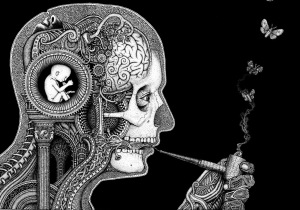Martin thinks logic doesn’t seem to help philosophy much. I am a great friend of logic, and think it both a) worthy of philosophical investigation in its own right and b) a very useful tool in the furthering of other philosophical goals. Nevertheless, I am aware it has limits. I’ll try and say something about all of these things, to convince you logic iz cool.

Logic is the study of what follows from what. Intuitively, we know what that means: for instance, John is happy follows from John is happy and John is tall, but not from John is happy or John is tall. For a remarkably large category of similar cases, people appear to agree on the nature of this “follows from” relation. But:
a) what is the “follows from” relation? The natural view that it boils down to linguistic convention, championed by Carnap & Wittgenstein, has been thoroughly demolished by Quine in the paper “truth by convention”. (In a nutshell, conventions are rules, and applying rules consistently requires logic. Thus we could not have adopted the rules of logic by convention; for we should have been without a guide for putting the conventions in place.) What then is it? And how do we all agree on such a large body of cases?
b) There are cases where “most” “ordinary” people “get it wrong”. Logicians, beginning in the mid 19th century with Boole, abstracted something like the familiar truth tables from reflecting on logical rules. These fit the vast majority of cases, and have proved very useful – the development of Boolean algebras and modern logic was instrumental in the computing revolution – but there are many logical truths and patterns of inference they to validate, such as (A -> B) v (B -> A), and from (A -> B) and ¬B infer ¬A, and from A -> B and B you may not infer A, which many “ordinary” people appear to get “wrong”. What is the status of such inferences?
c) there are also many interesting questions on the border of logic & mathematics, espeically in what’s known as “meta-logic”, that I won’t go in to here, but may in a future post.
Very well, you might say. Logic does offer a new quagmire for philosophers to get stuck in. But if logic itself has philosophical problems to be addressed, how can we hope for it to help us in other areas of philosophy?
We cannot hope that translating philosophical debates into logical languages will solve them. But *sometimes* it will serve to clarify what’s at stake. Descartes once argued:
1) I know I have a mind
2) I do not know that I have a body
—–
c) the mind is distinct from the body.
Part of the practice of logic is “schematising” arguments, abstracting from the particular content to see of a particular argument form is valid. This project can help us to assess philosophical arguments. Martin might be happy to see that Descartes’ argument for dualism is in fact invalid, as logical schematization reveals. The argument has the form:
1) I know that Fa
2) I do not know that Fb
—
c) ¬(a = b)
This argument is not valid: consider
1) I know Clark Kent
2) I do not know superman
—
c) Clark Kent is not superman
The premises of that argument can be true while the conclusion false; thus the form is not valid. This is not to say, of course, Descartes’ conclusion was wrong, only that we don’t have to worry about his particular argument for it.
Let me finish with a cautionary note on the limits of such gee-whizzery. The above example requires that we know how to “parse” Descartes’ argument correctly. For instance, we might also translate “I know that I have…” as *one* predicate, call it G. Then the formalization of Descartes’ reasoning would be:
1) Ga
2) ¬Gb
—
c) ¬(a = b)
which is straightforwardly *valid* by Leibniz’s law (two things are identical only if they have all the same properties, of which G is one). As is well known, there is no “algorithm” for parsing statements of ordinary language in the “correct” way, so just having tools of logic is not going to be enough to assess such arguments. Nevertheless, there is a clear and intuitive sense in which the latter parsing misses something out. If we employ logic in tandem with our intuitions, it is a useful – I would almost say necessary(1) – tool for telling good from bad arguments. To my mind, Descartes’ mistake *just was* to implicitly parse “I know that I have a…” as one predicate. Had we been there to schematize his argument, he might not have made the mistake.
However, as a further cautionary note, even if we do parse the argument “correctly” so that we include the operator “know”, we still have to know how that operator behaves. Those familiar with modal logic can observe the validity of the following argument ([]Fa reads “it is necessary that a is F”):
1) []Fa
2) ¬[]Fb
—
¬(a = b)
(since 2 implies there is a world at which b is not F, while 1 rules this out for a. I may be wrong about this though, as my first-order modal logic is not super refined). Thus we need to have an *antecedent* understanding of, e.g., the difference between knowledge and necessity as modal operators in order to carry out the formalization correctly in the first place. The task of working out plausible intuitions about the behaviour of operators like “S knows that p” or “it is necessary that p” or “S ought to p” is a central task of philosophical logic – it is extremely tricky, requiring good philosophy & good technical skill. At any rate, while I think logical formalizations can help to clarify lines of argument and objections to them, they will never be anything more in philosophy than a helpful device of clarification, at the end of the day, we shall always rely on our intuitive understanding of everyday concepts. We won’t be able to solve philosophical problems on computers by formalizing them or anything like that – at least not for the forseeable future!
(1) Arguments of continetnal philosophers are sometimes flat out contradictory or circular. I have particular arguments of Deleuze and Heidegger in mind. I’m not sure if logic can properly be used to assess such arguments, hence wavering on necessity. Maybe a future post.



